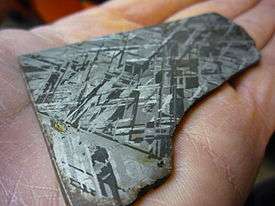Iron–nickel alloy
An iron–nickel alloy or nickel–iron alloy, abbreviated FeNi or NiFe, is a group of alloys consisting primarily of the elements nickel (Ni) and iron (Fe). It is the main constituent of the "iron" planetary cores and iron meteorites. The acronym NiFe refers to various chemical reactions that involve an iron–nickel catalyst or component, or in geology, to the general composition of planetary cores (including Earth's).
Some iron–nickel alloys are called nickel steel and usually contain additional elements, depending on the purpose.
Astronomy and geology
Iron and nickel are notable for being the final elements produced by stellar nucleosynthesis, and the heaviest elements formed with a supernova or similarly cataclysmic event.[1] Iron and nickel are the most abundant metals in metallic meteorites[2] and in the dense metal cores of planets such as Earth.
Nickel–iron alloys occur naturally on Earth's surface as telluric or meteoric iron.
Chemistry and technology
The affinity of nickel atoms (atomic number 28) for iron (atomic number 26) results in natural occurring alloys and a large number of commercial alloys, and provides a complex electron environment for catalyzing chemical reactions.[3]
In steel metallurgy, nickel is alloyed with iron to produce maraging steel and some low-alloy steels. Other technological uses include Invar and Mu-metal.
Overview
The following table is an overview of different iron–nickel alloys. Naturally occurring alloys are a type of mineral and called native elements or native metals. Some of the entries have more than one crystal structure (e.g. meteoric iron is a mixture of two crystal structures).
| Name | Description | Chemical formula/Weight percent Ni |
|---|---|---|
| Antitaenite | An intermetallic compound found in meteorites | Fe3Ni[4] |
| Awaruite | A native intermetallic compound found in serpentinites and meteorites | Ni2Fe to Ni3Fe |
| Earth's core | Earth's core is composed of an iron–nickel alloy. | about 5.5%[5] |
| Elinvar | The elasticity of this alloy does not change with temperature. | 36% (also 5% chromium) |
| Invar | A steel with very low thermal expansion | 36% |
| Kamacite | A native alloy found in meteoric iron | Fe0.9Ni0.1 |
| Maraging steel | A strong, malleable variant of steel | 15 to 25% |
| Meteoric iron | A combination of mostly kamacite and taenite and minor amounts of tetrataenite, antitaenite and awaruite | 5–30% |
| Mu-metal | An alloy with high magnetic permeability | 77% |
| Planetary core | Planets, moons and planetesimals can have cores made of an iron–nickel alloy. | Various |
| Taenite | A native alloy found in meteorites | NiFe |
| Telluric iron | A native alloy found on Earth (not extraterrestrial) | Fe (but 0.05 to 4% nickel) |
| Tetrataenite | A native alloy found in meteorites | FeNi |
References
- Wannier, P G (1980). "Nuclear Abundances and Evolution of the Interstellar Medium". Annual Review of Astronomy and Astrophysics. 18: 399. Bibcode:1980ARA&A..18..399W. doi:10.1146/annurev.aa.18.090180.002151.
- Mason, Brian Harold (1971) Handbook of Elemental Abundances in Meteorites Gordon and Breach, New York, ISBN 0-677-14950-6
- Pardo, A; De Lacey, AL; Fernández, VM; Fan, HJ; Fan, Y; Hall, MB (2006). "Density functional study of the catalytic cycle of nickel-iron NiFe hydrogenases and the involvement of high-spin nickel(II)". Journal of Biological Inorganic Chemistry. 11 (3): 286–306. doi:10.1007/s00775-005-0076-3. PMID 16511689.
- "Mindat Antitaenite". Mindat. Retrieved 9 January 2013.
- Lin, Jung-Fu (1 January 2002). "Iron-Nickel alloy in the Earth's core". Geophysical Research Letters. 29 (10). Bibcode:2002GeoRL..29.1471L. doi:10.1029/2002GL015089.
